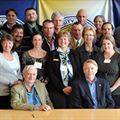
More than two dozen executives from around the world who are responsible for conservation of some of the most treasured places on earth are coming to California for help in making sure there’s a future for national parks.
 Attendees from as far as Ulaanbaatar and Kathmandu to Mexico and the United States will attend the National Parks Institute (NPI) Executive Leadership Seminar this month, where they will receive tools to address the challenges that threaten future generations.
Attendees from as far as Ulaanbaatar and Kathmandu to Mexico and the United States will attend the National Parks Institute (NPI) Executive Leadership Seminar this month, where they will receive tools to address the challenges that threaten future generations.
The seminar — a partnership between the University of California, Merced, the National Park Service, the Great Valley Center, the Institute at the Golden Gate, the National Parks Conservation Association and the Stanford Graduate School of Business — provides the opportunity for park leaders to share knowledge and learn how to anticipate and lead strategic change, reinvigorate their organizations and incorporate innovative thinking into their management repertoire.
Park leaders and managers of protected lands are faced with rapidly escalating problems such as climate change, habitat loss, encroachment into parks and protected lands, budget constraints and frequent changes in leadership — all of which make overseeing some of the most hallowed places in the world a sometimes overwhelming challenge.
“Today’s problems in park protection require a manager to be grounded in law, science and policy — a foundation made stronger by relationships with research universities,” said Steve Shackelton, associate director for National Park Service Visitor and Resource Protection.
“This program stresses these fundamental points and builds toward an international alliance of park managers who share techniques, scientific understanding, use of new technology and a quest for the most effective methods to protect natural and cultural resources and allow the people of the world to enjoy them.”
During the seminar’s intensive 12-day program, which begins April 17, park leaders use the lens of business management strategy to build a framework for action when they return home. Guided by researchers, naturalists and innovators, the park leaders learn how to approach rapid change in a time of restricted financial resources. The exploration of ideas is informed by current science, law and public policy and supplemented by field excursions, small-group problem-solving sessions and case study-based learning.
By involving park and protected area leaders from around the world, the Executive Leadership Seminar gives participants the opportunity to explore how different nations manage park resources within multiple different systems. Each cohort of participants is chosen to represent a diversity of perspectives — geographic, political, ecosystem, gender, age, organization type, management level and knowledge area.
The unique relationship between UC Merced and the National Park Service — demonstrated through the collaboration on the National Parks Institute — highlights the value of engagement and partnership between protected area managers and academic research institutions.
The seminar begins at Fort Baker in the Golden Gate National Recreation Area in San Francisco before moving to UC Merced and concluding in Yosemite National Park. The Bay Area provides the opportunity to learn about partnerships with community organizations and the changes happening in who visits national parks and what they want to do when they’re there. The changing visitor base, climate change and what it means for everything from water supply to forests fires will be explored at UC Merced.
“Our course focuses on real-world applications of science and organizational leadership to critical resource management issues,” said UC Merced engineering Professor Anthony Westerling, of the seminar presenters. “Participants will role-play resolving a fictitious dispute and participate in a climate change scenario analysis for wildfire in Yellowstone National Park and its implications for managing resources.”
While in Yosemite, participants will integrate the knowledge and tools gained from previous sessions through on-the-ground applications. As a large, flagship protected area with significant natural and cultural resources, high visitation and worldwide visibility, Yosemite provides the perfect case study for stewardship.
Each participant also provides a case study of his or her own, bringing a local park management challenge. With feedback from instructors and peers, participants develop implementable action plans to take home at the conclusion of the course.
Seminar participants also learn from the world’s leaders and innovative thinkers. After a public, plenary address hosted by UC Merced, keynote speakers retreat with participants for an intimate, class-only discussion.
This year’s presenters will include:
- Milton Chen, executive director emeritus of Edutopia, educational website and magazine that was created by the George Lucas Educational Foundation;
- Ruth Coleman, California State Parks director;
- Thomas Lovejoy, biodiversity expert and president of Heinz Center; and
- Gary Machlis, science advisor to the director of the National Park Service.
Previous keynote speakers include former President Jimmy Carter, Harvard Professor E.O. Wilson and National Park Service Director Jonathan B. Jarvis.
Brenda Ortiz

Senior Public Information Representative
Office: (209) 228-4203
Mobile: (209) 628-8263






